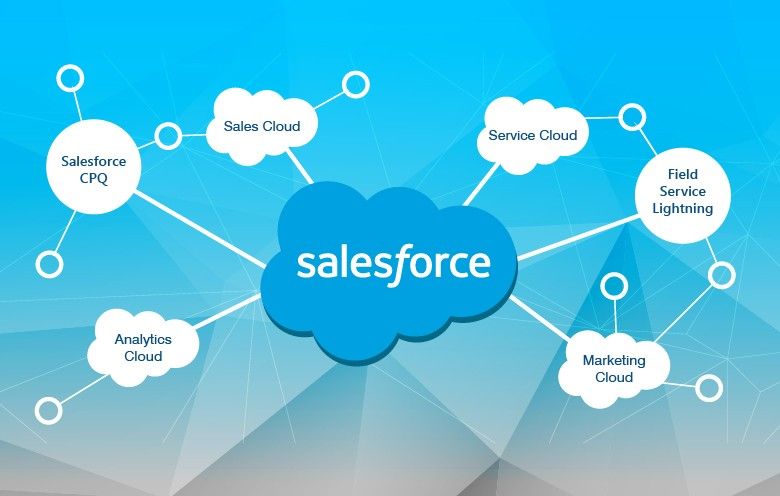Since its creation in 1999, Salesforce has become the world’s leading CRM (Customer Relationship Management) with over 150,000 customers worldwide. It is used by companies of all sizes, from startups to multinationals, in a variety of industries such as finance, real estate, retail, healthcare and many more.
In this article, we’ll explore the features and benefits of Salesforce , common use cases, editions and pricing, implementation guides, customizations and integrations, training and certifications, support resources, and more. as common challenges and solutions.
Introduction to Salesforce
Salesforce is a cloud-based platform that provides a customer relationship management (CRM) system to help businesses track and manage their relationships with customers, prospects, and partners. It is designed to help businesses improve sales efficiency, increase conversion rate, provide superior customer service, automate business processes, and gain accurate, real-time customer data.
Salesforce Features and Benefits
Salesforce offers a number of features and benefits that set it apart from other CRMs out there. Here are some of the key benefits of Salesforce:
- Cloud Platform: Salesforce is a cloud platform, which means all data is stored in the cloud and can be accessed from anywhere with an internet connection. This allows users to work remotely, collaborate in real time and have access to the latest data.
- Customization: Salesforce offers great flexibility when it comes to customization, allowing companies to create workflows and processes that meet their specific needs. Users can customize fields, reports, dashboards, and apps to fit their workflow.
- Automation: Salesforce offers advanced automation features, such as process automation, follow-up alerts, scheduled tasks, reminders, and workflows. These features allow users to automate repetitive tasks and focus on more important tasks.
- Artificial Intelligence: Salesforce uses artificial intelligence to deliver accurate sales forecasting, advanced market segmentation, product recommendations, predictive analytics, and task automation. This allows companies to make more informed decisions and gain efficiency.
- Integration: Salesforce can be integrated with other business applications such as accounting software, email systems, project management systems, and content management systems. This allows companies to centralize data and work more efficiently.
Salesforce Use Cases
Salesforce can be used in a variety of industries and for a variety of applications. Here are some examples of common Salesforce use cases:
- Sales management: Salesforce is primarily used for sales management. Sales teams can track leads, opportunities, quotes, orders, and invoices. They can also create sales forecasts based on historical and real-time data.
- Customer Service: Salesforce can be used to provide superior customer service. Support teams can track tickets, issues, and inquiries, as well as resolve issues quickly and efficiently.
- Marketing: Salesforce offers advanced marketing features like lead tracking, campaign management, results analysis, and message personalization. Marketing teams can target specific audiences and deliver relevant messages at specific times.
- Collaboration: Salesforce can be used to facilitate collaboration within the company. Teams can share information and data, collaborate on projects and tasks, and communicate in real time.
- Project management: Salesforce can be used to manage projects and tasks. Teams can track project progress, assign tasks, set deadlines, and communicate in real time.
Salesforce Editions and Pricing
Salesforce offers multiple editions based on specific business needs. The editions are as follows:
- Salesforce Essentials: This edition is intended for small businesses. It offers basic features such as sales and contact management, task and event management, dashboards and reports. Pricing starts from $25 per user per month.
- Salesforce Professional: This edition is intended for midsize businesses. It offers more advanced features such as lead management, workflow customization, and integration with third-party apps. Pricing starts from $75 per user per month.
- Salesforce Enterprise: This edition is intended for large enterprises. It offers advanced features such as supply chain management, user interface customization and integration with ERP (Enterprise Resource Planning) systems. Pricing starts from $150 per user per month.
- Salesforce Unlimited: This edition is for businesses with advanced customization and integration needs. It offers advanced features such as artificial intelligence, business process customization and integration with third-party applications. Pricing starts from $300 per user per month.
Get started with Salesforce
To get started with Salesforce, you must first create an account. Once you’ve created your account, you can start exploring Salesforce features. You can also download the Salesforce app from the App Store or Google Play.
Salesforce Implementation Guide
The Salesforce implementation process can seem daunting, but with the right guide, it can be quite simple. Here are the basic steps to implement Salesforce:
- Assess your needs: Before you implement Salesforce, you should assess your CRM needs . What are your business goals? What processes do you want to automate? What features do you need?
- Set up your account: Once you’ve assessed your needs, you can start setting up your Salesforce account. You can configure users, profiles and permissions.
- Import your data: The next step is to import your data into Salesforce. You can import data from sources such as Excel spreadsheets, databases, and existing CRM systems.
- Customize your account: Salesforce offers great flexibility when it comes to customization. You can customize fields, objects, workflows, and pages.
- Integrate Salesforce with Third-Party Applications: Salesforce can be integrated with a variety of third-party applications. You can integrate Salesforce with apps like Microsoft Outlook, Gmail, and QuickBooks.
- Train your users: For your Salesforce implementation to be successful, you need to train your users. Salesforce offers a variety of training resources, including online training, videos, and manuals.
Salesforce Customization and Integration
Customization and integration are two of the most important features of Salesforce. With Salesforce, you can customize fields, objects, workflows, and pages. You can also integrate Salesforce with third-party apps. Here are some of the Salesforce customization and integration features:
- Field Customization: With Salesforce, you can customize fields to meet your business needs. You can add custom fields, remove unnecessary fields, and rearrange fields.
- Customizing Objects: With Salesforce, you can customize objects to meet your business needs. You can add custom objects, remove unnecessary objects, and rearrange objects.
- Customize Workflows: With Salesforce, you can customize workflows to automate business processes. You can define trigger rules, steps and actions.
- Customizing Pages: With Salesforce, you can customize pages to meet your business needs. You can add components, remove unnecessary components, and rearrange components.
- Integration with Third-Party Applications: Salesforce can be integrated with a variety of third-party applications. You can integrate Salesforce with apps like Microsoft Outlook, Gmail, and QuickBooks.
Salesforce training and certification
Salesforce offers a variety of training resources to help users get the most out of their CRM. Here are some of Salesforce’s training resources:
- Trailhead: Trailhead is Salesforce’s online training platform. It offers free training modules and learning paths to help users learn how to use Salesforce.
- Salesforce Certifications: Salesforce offers certifications for users who want to demonstrate their expertise in using Salesforce. There are several levels of certifications, ranging from beginner to expert.
- Salesforce University: Salesforce University offers classroom and online training for users who want to learn more about Salesforce. The trainings are delivered by certified Salesforce instructors.
- Salesforce Videos: Salesforce offers a variety of training videos to help users understand Salesforce features. The videos are available on YouTube and on the Salesforce site.
Salesforce Support and Resources
Salesforce offers a variety of support resources to help users troubleshoot issues and get the most out of their CRM. Here are some of Salesforce’s support resources:
- Salesforce Help Center: The Salesforce Help Center is an online library of resources for Salesforce users. It offers user guides, FAQs, and training videos.
- Salesforce Community: Salesforce Community is an online forum where Salesforce users can ask questions, share tips, and connect with other Salesforce users.
- Salesforce Support: Salesforce offers phone, email, and live chat support to help users troubleshoot issues.
Common Salesforce Challenges and Solutions
Like any computer system, Salesforce can sometimes run into problems. Here are some of the common challenges faced by Salesforce users and their solutions:
- Performance Issues: Salesforce users can occasionally experience performance issues. Possible solutions include checking internet connection, clearing cache, and deleting temporary files.
- Security concerns: Security is a major concern for Salesforce users. Possible solutions include setting security policies, using two-factor authentication, and limiting user permissions.
- Setup issues: Salesforce users may encounter setup issues when customizing their account. Possible solutions include checking configuration settings, checking user permissions, and resetting default settings.
Conclusion
Salesforce is the world’s leading CRM and offers a variety of features to help businesses manage their business processes. In this article, we explored Salesforce features and benefits, Salesforce use cases, Salesforce editions and pricing, getting started with Salesforce, Salesforce implementation guide, customization and Salesforce onboarding, Salesforce training and certification, Salesforce support and resources, and common Salesforce challenges and solutions.
With the right training and support, Salesforce can be a powerful tool in helping companies achieve their business goals. Whether you’re a beginner or an expert, Salesforce offers a variety of resources to help you succeed.
What is Salesforce and how can it help my sales force?
What are the main features of Salesforce?
Why Use Salesforce for Customer Relationship Management?
How does Salesforce help companies improve their sales?
What are the benefits of using Salesforce for project management?
How can businesses integrate Salesforce with other systems?









